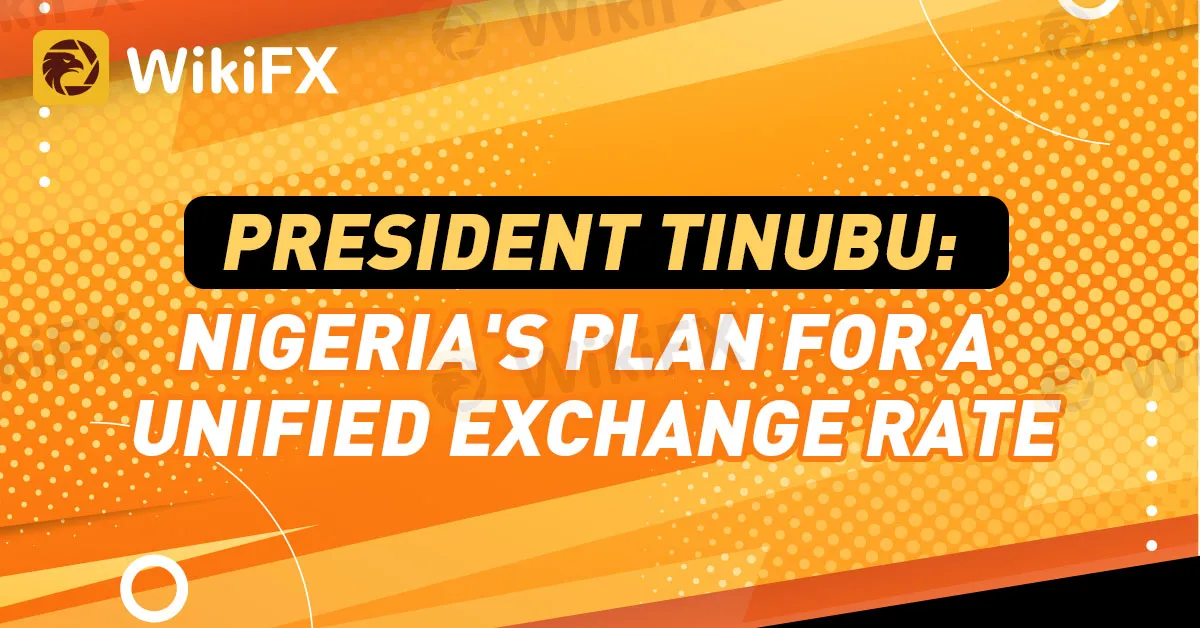简体中文
繁體中文
English
Pусский
日本語
ภาษาไทย
Tiếng Việt
Bahasa Indonesia
Español
हिन्दी
Filippiiniläinen
Français
Deutsch
Português
Türkçe
한국어
العربية
PRESIDENT TINUBU: NIGERIA'S PLAN FOR A UNIFIED EXCHANGE RATE
Abstract:The 16th and current president of Nigeria is a Nigerian politician by the name of Chief Bola Ahmed Adekunle Tinubu GCFR (born March 29, 1952).[1] From 1999 until 2007, he served as governor of Lagos State. During the Third Republic, he represented Lagos West in the Senate.

The 16th and current president of Nigeria is a Nigerian politician by the name of Chief Bola Ahmed Adekunle Tinubu GCFR (born March 29, 1952).[1] From 1999 until 2007, he served as governor of Lagos State. During the Third Republic, he represented Lagos West in the Senate.
Bola Ahmed Tinubu, the newly elected president of Nigeria, has unveiled his government's decision to unify the currency exchange rate, which was previously established by former President Buhari through the central bank. This move represents a significant shift in economic policy.
President Tinubu emphasized the importance of having a single currency exchange rate and highlighted the need to redirect funds from arbitrage activities towards more worthwhile investments. He also called for a reduction in interest rates, citing their negative impact on both Nigerians and businesses.
During his inauguration address on May 29, 2023, President Tinubu made the following statements, outlining his policy objectives:
· “The central bank should strive for a single exchange rate, diverting funds from arbitrage activities and channeling them into meaningful investments.”
· “Interest rates must be lowered as they currently pose challenges for consumers and businesses alike.”
President Tinubu's policy announcements indicate a new direction for economic governance in Nigeria. He also expressed the need for a “thorough cleansing,” directly criticizing the present central bank and its efforts to reduce inflation and maintain exchange rate stability.
UNIFYING EXCHANGE RATES
President Tinubu's decision to unify the currency exchange rate marks a departure from the policies implemented by the previous administration. The existing disparities in the system have created opportunities for arbitrage and hindered economic growth.
· By introducing a single exchange rate, President Tinubu aims to streamline the foreign exchange market and reduce distortions, thereby attracting more stable investments, and level the playing field for businesses operating in Nigeria. It will also simplify transactions by eliminating the complexities arising from multiple exchange rates, accurately reflecting the true value of Nigeria's currency, the naira.
· In the long run, this action is expected to attract foreign direct investment, and stimulate economic growth.
IMPLICATIONS FOR THE CENTRAL BANK OF NIGERIA
President Bola Ahmed Tinubu's plan to standardize the currency exchange rate and lower interest rates may impact the independence of the Central Bank of Nigeria (CBN).
· Traditionally, central banks have enjoyed a significant degree of autonomy without excessive government interference. However, the unification alters the CBN's role in managing the country's currency valuation.
· Concerns regarding the independence of the CBN and its ability to make impartial decisions based on economic factors may arise when the government assumes a more active role in determining exchange rate policies.
THE PATH AHEAD
The policy pronouncements made by President Tinubu during his inauguration speech signify a new direction for Nigeria's economic policies. The government's commitment to fostering economic stability, attracting investments, and promoting inclusive growth is evident through the unification and the call for lower interest rates.
Successful implementation of these planning, coordination, and engagement with the Central Bank of Nigeria and the financial industry. Addressing underlying issues and structural reforms crucial to the success of these programs.
Balancing the need with the imperative to stimulate economic expansion will be a key challenge for the government moving forward.

Disclaimer:
The views in this article only represent the author's personal views, and do not constitute investment advice on this platform. This platform does not guarantee the accuracy, completeness and timeliness of the information in the article, and will not be liable for any loss caused by the use of or reliance on the information in the article.
Read more

Singapore Businessman Faces Trial in $1.1 Billion Investment Scam
A 37-year-old Singaporean businessman, Ng Yu Zhi, is currently on trial for allegedly orchestrating one of the largest investment frauds in the country's history. The scheme reportedly defrauded more than 900 investors of SGD1.5 billion (approximately US$1.1 billion) between 2016 and 2021.

Two Victims Lose Over RM660K in Investment Scams
Two individuals recently fell victim to fraudulent investment schemes in Malaysia, losing a combined total of RM660,000. Both cases highlight the persistent threat of online financial scams and the need for caution when engaging with unverified platforms.

Five Reasons Every Trader Needs WikiFX on Their Phone
In the fast-paced world of forex trading, staying informed is essential. Traders need reliable tools to make better decisions and avoid costly mistakes. WikiFX is one such tool that every trader should consider. This application offers a range of features designed to enhance trading safety and provide valuable insights. Here are five reasons why WikiFX is a must-have for traders.

StoneX Financial Secures General Clearing Membership with ECC
StoneX Group Inc. has announced that its subsidiary, StoneX Financial Limited, has been granted General Clearing Member (GCM) status by European Commodity Clearing AG (ECC).
WikiFX Broker
Latest News
Capital.com Collaborated with Amazon in the UAE
Businessman Pleads Guilty to $5.9M Ponzi Scheme
Apple Pay, Google Pay Eyeing Launch in the Philippines
easyMarkets Kicks Off the Start of Its Trade with the Champions Competition
Hurry up!! Octa's New Year Promotion Begins
India Currency Note Scam: Victim Lose ₹3.17 Lakh
Coinbase Integrates Apple Pay for Easy Crypto Onramping
India's Major iX Global & TP Global FX Scam
Why the WikiFX App Should Be Installed on Everyone's Phone
Five Reasons Every Trader Needs WikiFX on Their Phone
Currency Calculator


